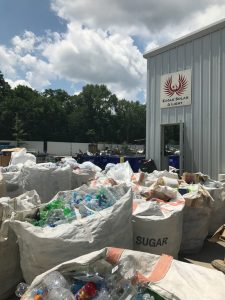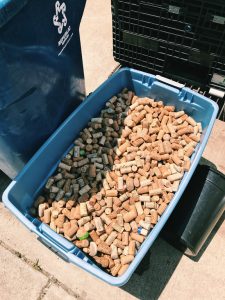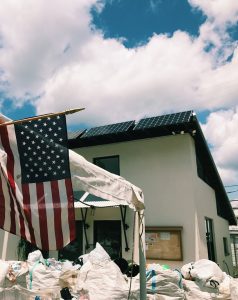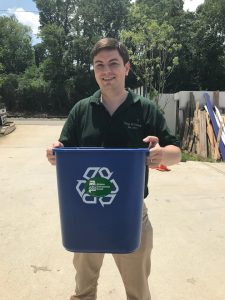Adventures of Hope:
Recycling vs. Littering
 Trash. Garbage. Junk. Rubbish. You can use any of these words to describe the waste that you toss into your trashcan. But what happens when you tie up the bag and leave it curbside?
Trash. Garbage. Junk. Rubbish. You can use any of these words to describe the waste that you toss into your trashcan. But what happens when you tie up the bag and leave it curbside?
This week I studied trash and where it ends up.
First, I learned about waste that is disposed of properly. To do this, I visited the Alabama Environmental Council to get a first-hand look at its operations in Birmingham’s exciting Avondale neighborhood.
 If you don’t use a curbside recycling bin, or your part of Alabama does not offer curbside recycling, you can drop off your recyclables directly at the AEC. There, you’ll find a large variety of recycled goods, including the following: paper, cardboard, glass, plastic, aluminum, steel, books, electronics, and, yes, wine corks. There’s even recycled glass used as a unique and colorful replacement for sand outside AEC’s solar-powered office.
If you don’t use a curbside recycling bin, or your part of Alabama does not offer curbside recycling, you can drop off your recyclables directly at the AEC. There, you’ll find a large variety of recycled goods, including the following: paper, cardboard, glass, plastic, aluminum, steel, books, electronics, and, yes, wine corks. There’s even recycled glass used as a unique and colorful replacement for sand outside AEC’s solar-powered office.
What about the things that can’t be recycled? Non-recyclable wastes are collected by local municipalities and taken to landfills spread throughout Alabama, a service generally paid for with your tax dollars.
This highlights a crucial benefit to recycling; if Alabama increased its recycling efforts, taxpayers would spend less money every year to send trash to landfills. The total amount of waste sent to landfills would decrease because the recyclable goods would be extracted and sent to recycling facilities like the AEC.
 The most interesting fact that I learned about the waste industry is that recycling isn’t just an environmental movement. It’s a huge business. Recycling centers sell all that organized waste to markets that demand it for profit. And the things you can’t recycle? Recycling centers won’t take waste that doesn’t have a market, just like any other business.
The most interesting fact that I learned about the waste industry is that recycling isn’t just an environmental movement. It’s a huge business. Recycling centers sell all that organized waste to markets that demand it for profit. And the things you can’t recycle? Recycling centers won’t take waste that doesn’t have a market, just like any other business.
Recycling centers across the nation are creating hundreds of thousands of jobs for Americans and bettering the unemployment rate. By increasing our recycling efforts and properly disposing of trash, we are creating a more sustainable job field in addition to a cleaner environment for everyone.
 Sadly, not all trash is recycled when possible, or even put into trash cans. Storm drains in cities are often mistakenly used as a place for waste. Storm drains exist to drain excess water from the street and sidewalks to prevent flooding. When trash is thrown into a storm drain, it can clog the drains causing localized flooding, or wash into connected creeks, rivers, and lakes, creating an immediate impact on wildlife and pollution levels.
Sadly, not all trash is recycled when possible, or even put into trash cans. Storm drains in cities are often mistakenly used as a place for waste. Storm drains exist to drain excess water from the street and sidewalks to prevent flooding. When trash is thrown into a storm drain, it can clog the drains causing localized flooding, or wash into connected creeks, rivers, and lakes, creating an immediate impact on wildlife and pollution levels.
During our educational presentations to schools, churches, clubs, and civic organizations, Black Warrior Riverkeeper shows audiences pictures of trash flowing from storm drains to creeks to rivers. While we hope that Alabamians will begin to recycle more, at the very least we hope to see less littering. As our friends at Alabama Water Watch like to say, “Love Thy Downstream Neighbor.” Don’t be a litterbug: please recycle!
Author Hope Runyan, a senior at The University of Alabama, has received a grant from the Curtis and Edith Munson Foundation to work with Black Warrior Riverkeeper. Runyan, a senior majoring in public relations, works for the organization as a communications intern throughout the summer. The grant, provided by a partnership between the Munson Foundation and The University of Alabama’s Department of Advertising and Public Relations, is the highest award given to a student in the College of Communication and Information Sciences. Read about all of Hope’s internship adventures here: blackwarriorriver.org/adventures-of-hope












